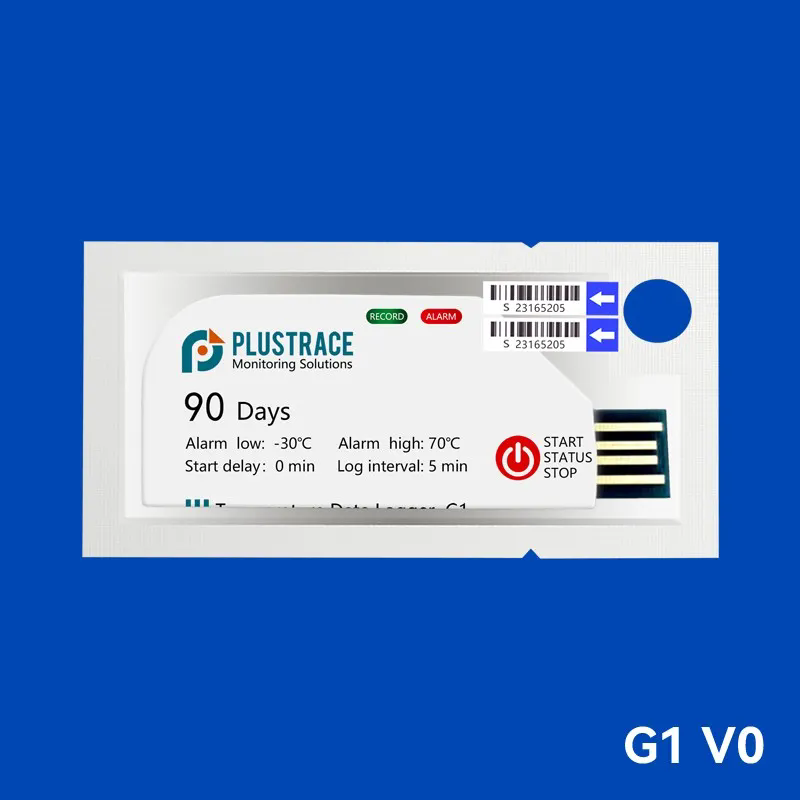What Is a Single Use Temperature Data Logger and How Does It Benefit Your Business?
2024-11-27
In industries where temperature-sensitive goods are transported or stored—such as pharmaceuticals, food, and chemicals—ensuring that products remain within a safe temperature range is crucial. This is where a single-use temperature data logger comes into play. But what exactly is a single-use temperature data logger, and why should businesses invest in it? In this blog, we’ll explore the function, advantages, and applications of these devices, and explain why they are becoming increasingly essential in today's world of temperature-controlled logistics.
What is a Single Use Temperature Data Logger?
A single-use temperature data logger is a small, portable device designed to monitor and record the temperature of goods during storage or transit. Unlike reusable loggers, single-use devices are meant to be used only once, providing a one-time record of the temperature conditions that products were exposed to.
These data loggers are typically small and battery-powered, with sensors that continuously track temperature over time. They store temperature data in their memory, which can be retrieved and analyzed once the item reaches its destination. The data is often accessed via a USB connection or wirelessly, depending on the model.
How Does a Single Use Temperature Data Logger Work?
Single-use temperature data loggers operate through an embedded temperature sensor that continuously measures the surrounding environment. They record data at regular intervals, creating a detailed log of temperature fluctuations throughout the journey or storage period.
Once the logger is activated, it begins monitoring the temperature. When the logger reaches its destination or when the product is no longer in transit, the data can be accessed through a reader or software. Some advanced models even feature alarms or notifications if the temperature goes out of the predefined safe range, alerting stakeholders to take immediate action.
Why Choose a Single Use Temperature Data Logger?
1. Cost-Effective and Easy to Use
Single-use data loggers are affordable and require minimal setup. Since they are discarded after use, there is no need to worry about maintenance or long-term costs associated with reusable devices. The simplicity of the setup process also makes them easy to deploy, even in environments where technical expertise may be limited.
2. Ensures Compliance with Regulations
Many industries, particularly pharmaceuticals and food, are subject to strict temperature control regulations. A single-use temperature data logger provides a reliable way to demonstrate compliance with these standards, offering verifiable proof that products were maintained within their required temperature range during transit or storage.
3. Improved Product Integrity
Temperature fluctuations can compromise the quality and safety of sensitive products, such as vaccines, perishable food, or chemical compounds. Using a temperature data logger ensures that any deviations from the safe temperature range are recorded and addressed, reducing the risk of spoilage, damage, or contamination.
4. Streamlined Data Collection and Reporting
With a single-use temperature data logger, businesses can easily collect and analyze temperature data. This is especially useful for quality control and traceability, as it provides a clear, time-stamped record of product handling conditions from start to finish. The data collected can be useful for internal audits, reporting to regulatory bodies, or addressing customer concerns.
5. Non-Intrusive Monitoring
Single-use data loggers are typically small, lightweight, and unobtrusive, which makes them ideal for use in a wide variety of packaging and transportation scenarios. They can be slipped into boxes, pallets, or even shipped inside the product itself without impacting the packaging or overall process.
Applications of Single Use Temperature Data Loggers
Single-use temperature data loggers are invaluable in industries where the temperature control of products is critical. Some of the key areas where these devices are commonly used include:
- Pharmaceutical Industry: Drugs, vaccines, and biologics are extremely sensitive to temperature changes. Single-use data loggers help monitor and ensure that these products are transported and stored under optimal conditions, ensuring efficacy and safety.
- Food and Beverage: Perishable goods like dairy, meat, and frozen products need to stay within specific temperature ranges to maintain their quality and prevent spoilage. Single-use data loggers help to track conditions throughout the supply chain, from production to delivery.
- Logistics and Supply Chain Management: Companies that deal with temperature-sensitive goods, whether perishable food or critical medical supplies, rely on single-use temperature data loggers to monitor environmental conditions during transit. This ensures products arrive in the condition expected.
- Cold Chain Monitoring: Cold chain logistics, which involves the transportation of goods at specific temperature ranges, benefits greatly from the use of single-use data loggers. They offer a cost-effective solution for tracking and verifying temperature conditions over the course of long-distance shipments.
Why Are Single Use Temperature Data Loggers Important for Your Business?
The use of single-use temperature data loggers brings multiple advantages to any business that handles temperature-sensitive products. They not only ensure product safety and quality, but they also help businesses maintain compliance with industry standards. By providing an easy-to-use, affordable, and reliable solution for monitoring temperature, these devices ultimately contribute to cost savings, improved customer satisfaction, and enhanced operational efficiency.
As industries increasingly recognize the importance of maintaining optimal environmental conditions for sensitive goods, the role of single-use temperature data loggers will continue to grow. For businesses that are looking to streamline their operations, ensure regulatory compliance, and safeguard their products, investing in these devices is an essential step towards achieving long-term success.



